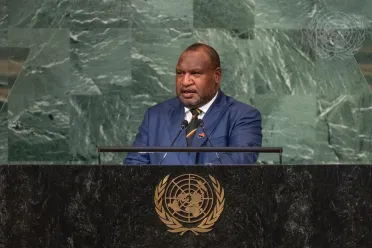Statement
Statement summary
JAMES MARAPE, Prime Minister of Papua New Guinea, urged the Assembly to act decisively for the collective good as “the alternative is to condemn ourselves to a future of doom and gloom”. Welcoming Our Common Agenda and the Transforming Education Summit, he stressed that for his country, education was “a key priority and is guided by our policy of leave no child behind, supported by our Education Sector Development Plan 2023-2027”. Further, citing the “Summit of the Future”, scheduled for September 2024, he said that finding solutions to the multiple crises the international community is facing should “be not defined by the lowest common denominator but rather be more ambitious, yet realistic and workable”. He reaffirmed his country’s commitment to engage in this process, and touched on a set of policies and legislative measures set in place by his Government which are geared towards making Papua New Guinea a middle-income country by 2050.
Reporting on his Government’s priorities for the next five years, ranging from industrializing the country’s economy to protecting its immense natural resources and biological diversity, he called on foreign investors to join the country in partnership in various sectors of renewable resources development. Stressing that the existing global economic and financial architecture is “weighed against developing countries” such as his, he urged for structural change. To this end, he supported fellow small island developing States’ calls for their development financing needs to be considered, by taking into account their dimensions of vulnerability rather than their gross national income and urged the international community to support the proposed SIDS Multi Vulnerability Index.
Touching on his Government’s initiatives in agriculture to foster revenue, empower communities and answer to global markets’ needs, he encouraged international partnerships in the field. Ahead of the 2022 United Nations Climate Change Conference, he underscored how climate change affects “coastal communities, including displacement and loss of identity as a people… in his own country and across the Pacific region and beyond, as the carbon emission level continues its destructive spiral out of control”. Reporting on his country’s efforts at implementing its Paris Agreement commitments, he called for an urgent global focus on conservation, preservation and sustainability of the world’s forests, especially with the support of those who produce the greatest carbon footprints. “It is Papua New Guinea’s humble view that the atmospheric balance of oxygen and carbon should be ranked the number one focus of all mankind,” he said. He supported Vanuatu’s initiative to seek an International Court of Justice Advisory Opinion on this existential threat.
Recognizing the importance of empowering and involving youth in decision-making, he welcomed partnerships in the sector and stressed that the country is a main sponsor and strong supporter of the Youth Office in the Secretariat. Combating gender-based violence is “a top priority for my Government”, he added, referring to the work done. Calling for global peace and stability, he urged upholding the Charter. On the Bougainville peace process, he said that “peace by peaceful means underpins this national priority”. He thanked the United Nations for its role in the Papua New Guinea-Melanesian conflict resolution. Finally, he “welcomed and supported the Emergency Special Session measures, invoked under the General Assembly with respect to the situation in Ukraine and to ensure the Security Council is accountable for their actions”.
Full statement
Read the full statement, in PDF format.
Photo

Previous sessions
Access the statements from previous sessions.
